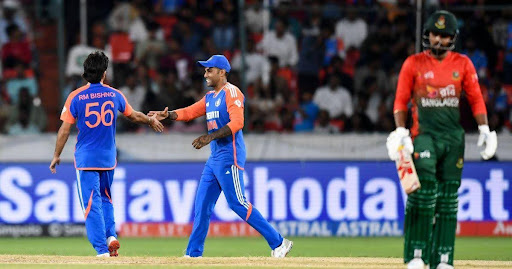
What Should Be Bangladesh's Next Steps After the Disappointing Show in Hyderabad?
What Should Be Bangladesh's Next Steps After the Disappointing Show in Hyderabad?
2024-10-14 Author : ch799
Bangladesh’s T20 saga took a nosedive into the abyss with a cringe-worthy 3-0 sweep by India, capped off
by a
jaw-dropping 133-run loss in Hyderabad. The scorecard didn’t just reflect a defeat; it painted a vivid
picture of the
Grand Canyon separating the two teams especially in their approach to the modern T20 game, where
Bangladesh seemed to be
stuck in a time warp! This latest series flop is just another feather in the cap of a growing collection
of
cringe-worthy performances in bilateral series and tournaments. It’s high time Bangladesh cricket had a
heart-to-heart
with itself in the mirror.
One of the most glaring issues for Bangladesh has been their outdated style of play. While teams like
India have
embraced a high-risk, high-reward approach, Bangladesh continues to play a conservative, almost archaic
version of T20
cricket. The modern T20 game demands aggressive batting, particularly in powerplays and middle overs.
Bangladesh,
however, has struggled to keep up, failing to adapt their strategies to the demands of the format.
In the Hyderabad match, Sanju Samson unleashed a breathtaking 40-ball century, teaming up with Suryakumar
Yadav for a
boundary-fest that made other teams question their life choices—232 runs purely from fours and sixes!
That’s a world
record that sent shockwaves through the cricketing cosmos. Meanwhile, Bangladesh's top order was busy
playing a game of
“How to Lose Your Wickets Quickly”.
Litton Das and Najmul Hossain Shanto have been playing a high-stakes game of "who can throw their wicket
away first"
after getting decent starts, making fans wonder if they’re auditioning for a slapstick comedy instead of
batting!
Meanwhile, Parvez Hossain Emon is still on the hunt for his cricketing identity, leaving us all wondering
if he’s a
budding superstar or just a friendly face in the lineup. Without a solid opening partnership, the rest of
the batting
order looks like a jigsaw puzzle with missing pieces.
Towhid Hridoy, one of Bangladesh’s standout performers in the series, reflected on their batting struggles
after the
Hyderabad match, emphasizing the need for improvement as a batting unit. His 63 off 42 balls was a rare
highlight, but
it underscored the lack of support from his teammates. Along with Shanto and Taskin, Hridoy expressed
concerns about
Bangladesh’s difficulty in reading pitches and adapting to varying conditions, especially on
batting-friendly wickets
like those in India. Addressing this weakness is crucial for Bangladesh moving forward.
Time for Change
One of the more troubling insights came from Hridoy’s post-match comments, where he emphasized that
Bangladesh’s players
are not accustomed to playing on flat, batting-friendly wickets. Most of Bangladesh’s domestic cricket is
played on
spin-friendly surfaces in Mirpur and Chittagong, and this overreliance on familiar conditions is hampering
their ability
to adapt.
Bangladesh’s struggles on batting-friendly tracks are apparent not only from their performance in India
but also from
their recent challenges against other teams. Losses to Sri Lanka and even the USA earlier this year
underline a broader
concern: Bangladesh isn’t evolving as a T20 side. The team requires more exposure to challenging
conditions that test
their skills and push them to adapt, as improvement won’t happen overnight.